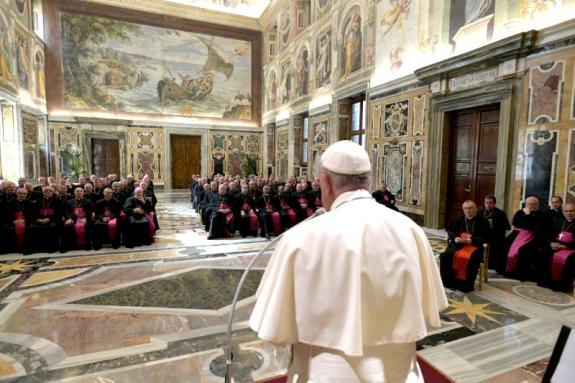He made remarks today to apostolic nuncios from around the world:
Apostolic nuncios are called to be men of faith focused on proclaiming the Gospel and shunning the power and corruption that can come from the luxurious trappings of their diplomatic status, Pope Francis said.
The pope met June 13 with more than 100 Vatican diplomats, who serve either as nuncios — ambassadors — or as the Holy See’s permanent observers at U.N. and other international agencies.
The nuncio represents the pope and while the nuncio, like anyone, may have “reservations, sympathies or antipathies,” a good nuncio cannot be a “hypocrite” and engage in back-stabbing, Pope Francis said in his prepared remarks.
“It is irreconcilable, therefore, to be a pontifical representative while criticizing the pope behind his back, to have a blog or even unite with groups hostile to (the pope), the Curia or the church of Rome,” the text said.
Reading the full text of his remarks (translated by the Vatican website from the original Italian) however, you find some sage advice for all of us who serve the Church and, in effect, represent it and the Holy Father to the world:
I thought of sharing some simple and elementary precepts with you today, which you certainly know well, but remembering them will be good for everyone and will help you to live your mission better with the same enthusiasm of the first term and with the same fervent availability with which you have your service started.
It is a kind of “decalogue” which, in reality, is addressed through you also to your Co-workers and, indeed, to all the bishops, priests and consecrated persons you meet in every part of the world.
1 – The Nuncio is a man of God
Being a “man of God” means following God in everything and for everything; obey his commandments with joy; to live for the things of God and not for those of the world; to freely devote all his resources to him by accepting with a generous spirit the sufferings that come as a result of faith in him. The man of God does not deceive nor deceive his neighbor; he does not let himself go into gossip and slander; it preserves the pure mind and heart, preserving eyes and ears from the filth of the world. He does not let himself be deceived by worldly values, but looks to the Word of God to judge what is wise and good. The man of God seriously tries to be “holy and blameless before him” (see Eph1.4). The man of God knows how to walk humbly with his Lord, knowing that he must rely only on Him to be able to live fully and endure to the end, keeping the heart open to the disadvantaged and the rejected by society and listening to people’s problems without judging them. The man of God is the one who practices justice, love, clemency, piety and mercy.
The Nuncio who forgets that he is a man of God ruins himself and others; he goes off the track and also damages the Church, to which he has dedicated his life.
2 – The Nuncio is a man of the Church
Being the Nuncio Papal Representative, he does not represent himself but the Church and in particular the Successor of Peter. Christ warns us of the temptation of the wicked servant: “If this wicked servant said in his heart: My master is slow in coming, and he began to beat his companions and to drink and eat with the drunkards, the master will come when the servant does not he waits and in the hour he does not know, he will punish him with rigor and inflict on him the fate that the hypocrites deserve “( Mt 24.48-51).
The Nuncio ceases to be a “man of the Church” when he begins to treat his collaborators, staff, nuns and the nunciature community badly as a bad master and not as a father and pastor. It is sad to see some Nunzi afflicting their collaborators with the same sorrows that they themselves received from other Nuncios when they were collaborators. Instead the Secretaries and Councilors have been entrusted to the experience of the Nuncio so that they can form and flourish as diplomats and, if God wants, in the future as Nunzi.
It is bad to see a Nuncio looking for luxury, clothes and objects “signed” among people without the necessary. It is a counter-witness. The greatest honor for a man of the Church is to be “servant of all”.
Being a man of the Church also requires the humility to represent the face, teachings and positions of the Church, that is, to put aside personal beliefs.
To be a man of the Church means to courageously defend the Church before the forces of evil that are always trying to discredit it, to defame it or to slander it.
Being a man of the Church requires being friends with bishops, priests, religious and the faithful, with confidence and human warmth, carrying out their mission alongside them and always having an ecclesial outlook, that is, of a man who feels responsible for salvation of others. We always remember that the salus animarum is the supreme law of the Church and is the basis of all ecclesial action. [1] This identity of the Nuncio also leads him to distinguish himself from the other Ambassadors in the great feasts, Christmas and Easter: when those are absent to reach the families, the Nuncio remains in place to celebrate the feast with the people of God in the country because, being man of the Church, this is his Family.
3 – The Nuncio is a man of apostolic zeal
The Nuncio is the announcer of the Good News and being an apostle of the Gospel has the task of illuminating the world with the light of the Risen One, of bringing Christ to the ends of the earth. He is a man on a journey who sows the good seed of faith in the hearts of those he meets. And those who meet the Nuncio should feel questioned in some way.
We recall the great figure of St. Maximilian Maria Kolbe who, consummated by the ardent zeal for the glory of God, wrote in one of his letters: “In our times we see, not without sadness, the spread of” indifferentism “. An almost epidemic disease that is spreading in various forms not only in the generality of the faithful, but also among the members of religious institutes. God is worthy of infinite glory. Our first and foremost concern must be to give him praise to the extent of our weak strengths, aware that we cannot glorify him as he deserves. The glory of God shines above all in the salvation of the souls that Christ has redeemed with his blood. It follows that the primary commitment of our apostolic mission will be to procure the salvation and sanctification of the greatest number of souls.
We also remember the words of Saint Paul: “For me it is not a source of pride to preach the gospel; it is a duty for me: woe to me if I do not preach the gospel “( 1 Cor 9:16). It is dangerous to fall into the timidity or tepidity of political or diplomatic calculations, or even into the “politically correct”, giving up the announcement.
Apostolic zeal is that force that keeps us upright and protects us from the cancer of disillusionment.
4 – The Nuncio is a man of reconciliation
It is an important part of the work of every Nuncio to be a man of mediation, communion, dialogue and reconciliation. The Nuncio must always try to remain impartial and objective, so that all the parties find in him the right arbitrator who sincerely tries to defend and protect only justice and peace, without ever allowing himself to be negatively involved.
Being a man of communication, “the activity of the Pontifical Representative brings first of all a precious service to the Bishops, to the Priests, to the Religious and to all the local Catholics, who find in him support and protection, as he represents a Higher Authority, which is for everyone’s benefit. Its mission does not overlap with the exercise of the powers of the Bishops, nor does it replace or obstruct it, but respects it and, indeed, favors it and supports it with fraternal and discreet advice.
If a Nuncio closes himself in the Nunciature and avoids meeting people, he would betray his mission and instead of being a factor of communion and reconciliation it would become an obstacle and impediment. You must never forget that you represent the face of catholicity and the universality of the Church in the local Churches scattered throughout the world and in the Governments.
5 – The Nuncio is a man of the Pope
As a Pontifical Representative, the Nuncio does not represent himself but the Successor of Peter and acts on his behalf at the Church and the Governments, that is, he concretizes, implements and symbolizes the presence of the Pope among the faithful and the populations. It is nice that in several countries the Nunciature is called “Casa del Papa”.
Certainly every person could have reservations, likes and dislikes, but a good Nuncio cannot be hypocritical because the Representative is a link, or better, a bridge of connection between the Vicar of Christ and the people to whom he was sent, in a certain area, for which he was appointed and sent by the Roman Pontiff himself.
Your mission, therefore, is very demanding because it requires availability and flexibility, humility, impeccable professionalism, communication and negotiation skills; it requires frequent car journeys and long journeys, that is, living with the suitcase always ready (in our first meeting I told you: yours is a nomadic life).
Being sent by the Pope and the Church, the Nuncio must be prepared for human relationships, have a natural inclination for interpersonal relationships, that is, be close to the faithful, priests, local bishops, and also to other diplomats and rulers.
The service of the Representative is also to visit the communities where the Pope is unable to go, assuring them of the closeness of Christ and of the Church. Thus St. Paul VI wrote: “It is, in fact, evident that the movement towards the center and the heart of the Church must be matched by another movement, which from the center spreads to the periphery and leads in a certain way to all the individual local Churches, to all and individual pastors and the faithful the presence and witness of that treasure of truth and grace, of which Christ the Lord and Redeemer has made us sharers, depositories and dispensers. Through Our Representatives, who reside in the various Nations, we make ourselves participants in the very life of Our children and almost inserting ourselves in it we come to know, in a more expedited and sure way, their needs and aspirations together “.[5]
Being “Representative”, the Nuncio must continually keep up to date and study, in order to know well the thoughts and instructions of those who represent. He also has the duty to continually update and inform the Pope about the different situations and ecclesiastical and socio-political changes in the country to which he is sent. For this reason it is essential to have a good knowledge of his customs and possibly of the language, keeping the door of the Nunciature and that of his heart always open to everyone.
It is therefore irreconcilable to be a Pontifical Representative criticizing the Pope from behind, having blogs or even joining groups hostile to him, to the Curia and to the Church of Rome.
And Holy Father concludes:
The Nuncio is a man of humility
I would like to conclude this handbook with the virtue of humility, citing the “Litany of humility” of the Servant of God Cardinal Rafael Merry del Val (1865-1930), Secretary of State and collaborator of Saint Pius X , one of your former colleagues:
O Jesus, meek and humble of heart, hear me!
From the desire to be esteemed – Free me, Jesus.
From the desire to be loved – Free me, Jesus.
From the desire to be praised – Release me, Jesus.
From the desire to be honored – Release me, Jesus.
From the desire to be praised – Release me, Jesus.
From the desire to be preferred to others – Free me, Jesus.
From the desire to be consulted – Free me, Jesus.
From the desire to be approved – Free me, Jesus.
From the fear of being humiliated – Free me, Jesus.
From the fear of being despised – Release me, Jesus.
From the fear of suffering repulse – Free me, Jesus.
From the fear of being slandered – Free me, Jesus.
From the fear of being forgotten – Free me, Jesus.
From the fear of being ridiculed – Release me, Jesus.
From the fear of being abused – Release me, Jesus.
From the fear of being suspected – Free me Jesus.
Let others be loved more than me – Jesus, give me the grace to desire it!
May others be valued more than I – Jesus, give me the grace to desire it!
May others grow in the opinion of the world and may I diminish – Jesus, give me the grace to desire it!
May others be employed and I put aside – Jesus, give me the grace to desire it!
May others be praised and I not treated – Jesus, give me the grace to desire it!
May others be preferred to me in everything – Jesus, give me the grace to desire it!
May others be holier than me, as long as I become a saint as much as I can – Jesus give me the grace to desire it!
Read it all. It’s ample food for thought for all of us.













